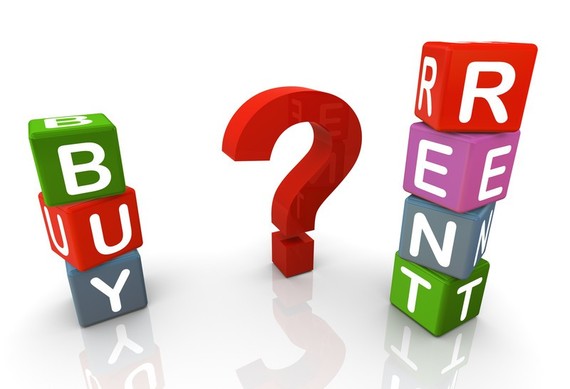Consumers these days are bombarded with information through the Internet. They can read reviews of any product they may be considering to buy. There are consumer reporting and review sites with the stated objective of advising consumers about what is a good deal and what is not. There are consumer product safety sites with loads of product safety information.
It's "information overload" for many, but there is interest in reports by market area as to whether it's more cost effective to rent or buy a home. Over at Trulia.com, an article about rent vs buy economics in October 2014 states: "Homeownership remains cheaper than renting nationally and in all of the 100 largest metro areas. In fact, buying is 38% cheaper than renting now, compared with 35% cheaper than renting one year ago."
There are obvious factors creating this disparity. Low mortgage interest rates for purchase and rising rents are the primary factors creating this situation. And, if all you look at are the direct costs of ownership as a snapshot in a market, it is clearly less expensive to own than to rent. Even considering that property taxes and insurance costs can rise outside the control of the owner, buying still looks pretty good.
I am a real estate investor, so I do tend to prosper more when there is a healthy rental market, whether investing directly in rental properties or fix & flip and wholesaling to other investors. Of course, there is a great profit potential in fix & flip to retail consumer buyers, and that market is really healthy right now. All of this considered however, there really are other considerations consumers need to think about when making the rent vs buy decision.
Non-cost Considerations of Rent vs Buy
Will you need to move in under 8 years?
Especially with today's higher down payments, it is anywhere from around 6 to 8 years before a home buyer can expect to get their money out of a home sale after the costs of sale. Those can be significant, with title insurance and real estate commissions being the largest costs of sale. If you're not sure about having to move being out of your control, buying may not be wise.
Are you just starting a new family?
This isn't a problem really unless you do like many first time buyers and get into a starter home that's fine for two of you. However, when children enter the picture within a few years, will you be pushed into upsizing and selling before you can recoup your costs, much less get any appreciation in equity?
Is being forced to move a rental issue?
Tenants have little control over when their landlord may decide to sell the home. Generally, leases are for a year or less, so you can possibly be forced into a moving decision far sooner than you like. One buyer surveyed said that they were forced to move three times in three years, so they bought as a self-defense move. Their costs of moving that frequently were high, even disregarding the inconvenience.
Are you trading travel costs in this choice?
Many of today's best jobs are in technology, financial and medical sectors, and these companies tend to locate in large urban areas. Buying is usually much more costly close to the workplace. Moving farther out to buy affordably can result in hundreds of dollars in travel costs every month.
The smart move is to consider every factor impacting your lifestyle, instead of just looking at a direct cost breakdown. Sometimes renting may be a good "now" decision that you can far more easily change later than taking the buy first approach.

